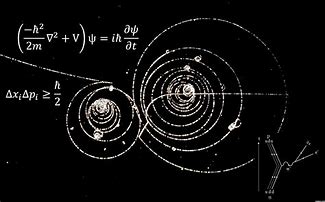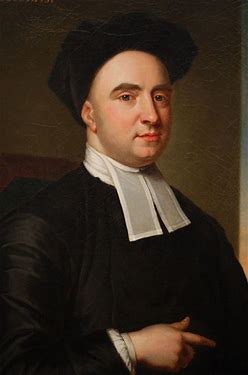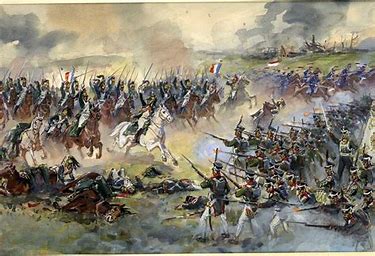In quantum mechanics, the uncertainty principle, also known as Heisenberg's uncertainty principle, is any of a variety of mathematical inequalities asserting a fundamental limit to the precision with which certain pairs of physical properties of a particle, known as complementary variables, such as position x and momentum p, can be known simultaneously.
In other words you can’t know where a particle is and how fast
it’s going at the same time. As importantly you can never predict with any
accuracy where that particle will be at any given time, but only suggest the
probability of its being there.
Quantum mechanics was not only a revolutionary mathematical
theorem but a philosophical one. For centuries scientists and mathematicians
assumed certainty. Things were or they weren’t, nothing in between, vague,
imprecise, and uncertain. Mathematical and physical problems might be difficult
to solve, but once they were, they would remain fixed and explicit until they
were successfully challenged.

Even philosophers questioned the nature of things – Bishop
Berkeley wondered whether a falling tree would make a noise if there was no one
in the woods to hear it. Einstein postulated that an astronaut travelling at
near the speed of sound would age less than those he left behind. There was
something peculiar about time, he said, that did not follow human perceptions
and laws.
If Einstein was right, might there be a way to slow time so that
we might have more of it? Or as Berkeley suggested, might there be more than one
perceptual worlds?

In both cases, no matter how intriguing the theory or the
subsequent questions, the ideas were solid. One may never know or experience
the slowing of time, but one day it would be proven. Similarly, there may be
such a thing as concomitant reality – two worlds, one unpopulated and the
other populated but both available to one observer simultaneously.
Max Planck, Heisenberg and others when devising the discipline of
quantum mechanics dealt with a very different and perplexing reality – a
probable, uncertain one. Until or unless an new, revolutionary theory is
discovered, we will have to assume that our logical, rational, practical laws of
assumed existence do not apply in the particle world. And if they do not exist
there, in what other spheres of existence might they be displaced
by uncertainty?
Probability of course is nothing new. We never know for sure
whether it is going to rain or not in ten days; or whether the stock market will
go up or down; but we can assess risk and probability and make an educated
guess. In fact most decisions are based on uncertainty; and other than the most
obvious fixed, absolute things – sinks, dogs, or water – we live in a
probabilistic world.
Yet this is still nothing like the uncertainty of quantum physics
where it is impossible to determine exactly where a particle will be.
Eventually weather forecasting will be so accurate that we will know far in
advance about every climatic event; but we will never be able to pinpoint the
location of a particle travelling at a given speed.
Since quantum physics is a mathematical fact; and since its
application to other physical events is not beyond the realm of possibility; and
since normal, everyday life is necessarily one of probability and uncertainty;
then why should anyone care about pinpointing anything? Why does the question
‘Who am I’ persist even though we are composed of billions of bits of DNA
material acquired over millennia from unknown ancestors which has been twisted,
configured, and formulated again and again each time one’s genome gets mixed up
with someone else’s?
Men and women of questionable or indeterminate sex are
not left alone with their uncertainty, but either asked to choose one binary
option or the other; or most recently to subscribe to a new category –
transgender. Sexual uncertainty is not an option, despite the fact that given
the fundamentally uncertain nature of human existence, it might well be.
It is quite human and natural to want to fix things in place, to
configure them according to familiar, prescribed categories, and to present a
cogent, coherent unity. Things are much easier that way.
Everything we do is contingent upon something else. Napoleon,
suggested Tolstoy, lost the crucial Battle of Borodino not because of failing
mettle but because of a cold which had been brought on by wet feet in turn
caused by the failure of his valet to bring his gumboots to the battlefield.

We are not only simply a collection of randomly configured DNA but
of random events which occurred in the recent and distant past. There is the
possibility that enough of Great-great grandfather Hiram’s genetic bits showed
up in one of his descendants and they turned out to be the same profligate
wastrel that he was. Who would know? And who could predict?
To be sure image and identity serve a useful purpose. If there
were no titles, genealogical history, performance markers, behavioral traits
that told our story to others, everyone would be confused. It is not that
identity is not important; it is that it is not existentially important.
By focusing to such an exaggerated degree on personal identity, we
lose the most essential human characteristic – dynamism. While we are most
certainly programmed by nature and nurture, there is nothing that enslaves us to
either one. In fact, a life of deliberate uncertainty – about God and the
nature of religion, metaphysics, epistemology, sexuality, social exchange and
structure – may be the most fulfilled.
For Nietzsche and Schopenhauer the individual and the expression
of his pure will was the ideal form of existential reality in a meaningless
world; and in some way their theories touched on the principles of uncertainty.
Yet they called for a very certain, distinct, and unmistakably unique,
determined, willful individual.
Personal uncertainty goes beyond nihilism and determinism, for the
‘uncertain’ individual never searches for identity, individuality, or
personhood. He is quite happy with the cards he has been dealt, the vagaries of
the probabilistic environment in which he lives, and sees no need to waste time,
energy, or emotion on figuring out what’s what.
Today’s society is obsessed with identity – sexual, philosophical,
social, and personal. It is unconscionable for
anyone to demur or even refuse the categorization, the first step to
mobilization, civic action, and change. In fact, in order for
things to change, they have to be themselves identified, categorized, and marked
for intervention. There can be no uncertainty in the revolution.
Markers are everywhere – LGBT, conservative, liberal,
environmentalist, fundamentalist, traditional, entrepreneurial, exploitative.
More conservative Americans who have never had any belief in
either progress, idealism, or a better world and who have relied on history for
guidance, are indifferent about these charges against Trump. They see no
problem with his eccentricity, vagaries, or inconsistencies. They – and life –
are like that.
Most of us desperately want something to hang on to and are
uncomfortable with anything shaky, precarious, or uncertain. We want things in
their place day after day, absolutely fixed and as unchangeable as possible. We
are afraid of both the dark and what’s around the corner.
A few of us are unconcerned about ‘fixation’ and are happy to
give in to our jumbled, garbled, and often incoherent ways. We don’t care who
we are, what we represent, or how we fit in. We are neither Nietzschean
supermen nor Napoleonic geniuses; but are quite content with our uncertainty and
that of everything else.



No comments:
Post a Comment
Note: Only a member of this blog may post a comment.